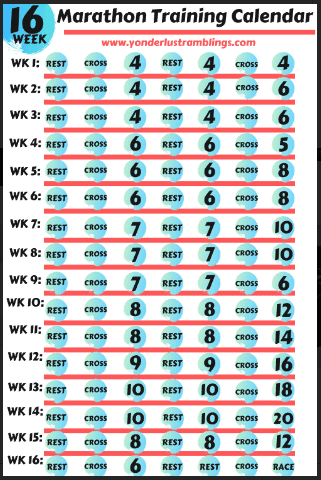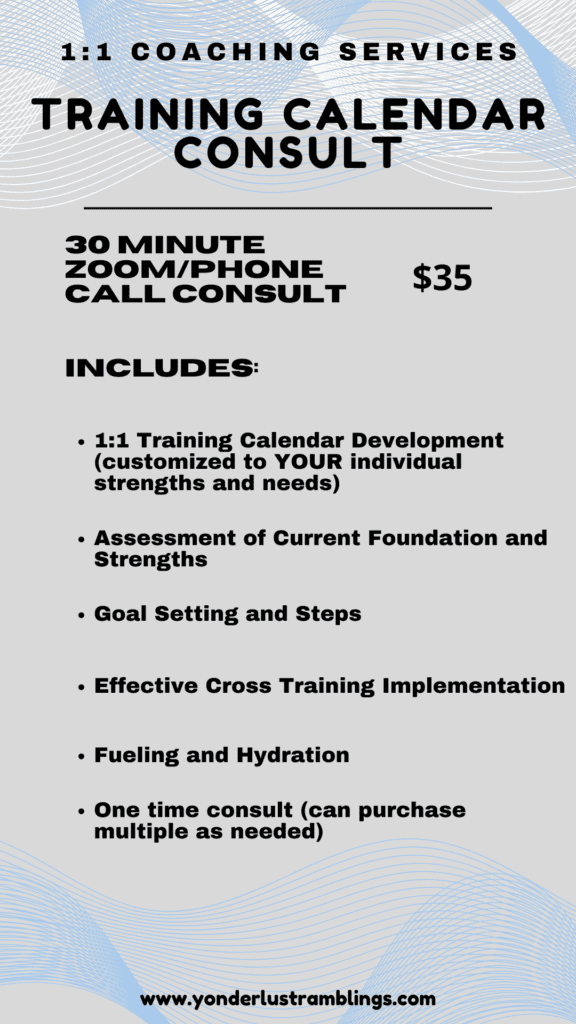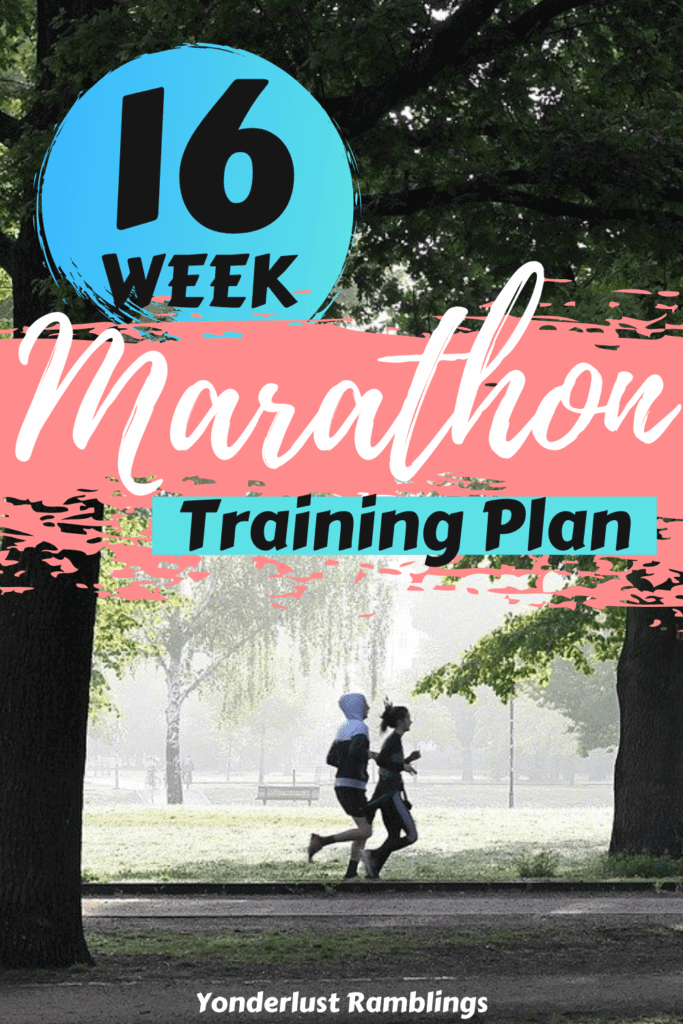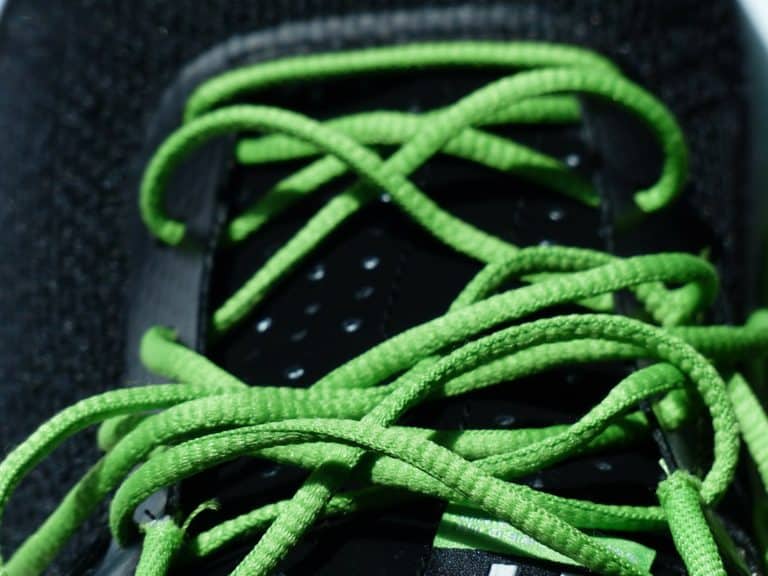16 Week Marathon Training Plan for Beginners
Who wouldn’t want to endure 26 miles of sweat, cramps, blisters, and exhaustion? The payoff for completing a full marathon, however, far outweighs those cramps, blisters, and sweat. It is a feeling of accomplishment unlike any other. There is no goal more worthy of undertaking. If you are new to running, or just new to the full marathon distance, you need the right blueprint to get started: a beginner marathon training plan. A straightforward, realistic blueprint that clearly outlines everything you need to be successful in completing your marathon, including weekly increments, rules to follow, rest and cross training, and the right mindset. On top of that, you will need a proven marathon training calendar, so that you can stick to your marathon training program. If you are looking for a new challenge, consider this 16 week marathon training plan for beginners your “starting line”.
Disclosure: Below are some affiliate links-these are all products I highly recommend. I won’t make any recommendations on this page that I haven’t tested or personally used! Enjoy this guide to your 16 week marathon training plan for beginners.
Table of Contents
16 Week Marathon Training Plan for Beginners
I have completed both half and full marathons in my active travel experiences, and I have to say that running and competing in a full marathon is the ultimate test of true grit for me. Not only does competing on race day take true determination, but the hours upon hours upon hours of training that leads up to a marathon is monumental.
Imagine waking up on a Saturday morning and running 20 miles, just to train? If that sounds like perfect weekend plans, then you were built for a marathon training program! For those of you who long for and thrive on that particular sense of crazy accomplishment, you are in the right place!
Let me say that I personally developed this beginner marathon training plan, because I remember when I needed one myself. I remember being in my 20’s and never having run more than a mile. Back then, I loathed running. Absolutely hated it. I had zero confidence in myself that I had the ability to run an insane distance like 26 miles.
I developed this 16 week marathon training plan from years and years of sweat, tears, frustrations, and ultimately, successes. Hence the reason I have found it so valuable to have a precise marathon training program to follow.
I was not granted the natural ability to be good at running long distances. Though I love training and participating in long distance runs, hear me when I say that running is not and never has been easy for me. I had to train myself with a solid marathon training program blueprint. I learned that if you do not have a marathon training program in place, you are more likely to abandon new ideas. This 16 week marathon training plan is visual, step by step, and very intentional.
Years later, my detailed training plans have prepared and propelled me through 5,000 steps on the Great Wall, over ice caps on Greenland’s Arctic tundra, along rugged Canadian coastlines, and many, many hard earned and rewarding miles in between.
“Runcations” are now an integral part of my active travel lifestyle. It has been a slow, intentional learning process, but one that has given me a lot of insights from tried and true practices.
So, are you ready to take on your first marathon? Of course you are, but first you will need a comprehensive 16 week beginner marathon training plan. Implementing a proven plan like this involves 12 critical steps.

#1: Formulate Your Training Plan
One thing I have learned about implementing a marathon training schedule for beginners, is that you cannot just wing your training. You have to intentionally schedule your training runs, and be consistent every week. Consistency and commitment are key in any beginner marathon training plan.
The majority of marathon training programs I have seen will have you running 4 times every week – 3 short runs and 1 long run. When I first started out, I subscribed to this schedule, until my body started to show some signs of wearing down and burning out.
You have to know and listen to your body, and after acknowledging that, I determined that the ideal marathon training schedule for myself is running 3 times a week, with 2 days of cross training and/or strength training, and 2 days of rest. Here is the beginner marathon training plan I personally developed and utilize.

***Download your own 16 week training calendar HERE!!!
*Want professional coaching and support to help develop your own INDIVIDUALIZED marathon training schedule like the one you see above? Let me help you create your OWN calendar for success with tailored cross training, incremental long runs, and practice runs built in that work for YOU! I’ll assess where you are today, and build you a plan to get you where you need to be! Get started HERE!
#2: Intentionally Schedule Your Training Runs
Running is a total mental game. As I mentioned before, running is NOT easy for me. I battled the inner talk for years to slack off on training. I entertained ideas to put off running. If you tell yourself that you will run “when I have some free time”, or “when I get this done”, your mind will attempt to talk you out of it every time!
You have to intentionally set aside the time, and consistency is key! The one thing that has worked like magic for me is to designate the same “running days” each week. Otherwise, I know I will come up with a million reasons why I can’t get around to running.
My designated training run days each week are Tuesdays, Thursdays, and Saturdays, as shown in my 16 week marathon training plan for beginners above. Sure, things come up and adjustments have to be made at times. But if you have your running days marked on the calendar and have given them priority, you will find that other things that pop up have a way of being able to be worked around your marathon training schedule.
Yes, I literally have all my running days marked on my calendar, and I highly recommend you plan out your running days as well. I even go so far as to check off or highlight each run on my calendar when completed. I give myself 16 weeks (4 months) to train for every race I participate in, so my calendar will have my entire 4 months of Tuesdays, Thursdays, and Saturdays runs planned out in advance.
#3: Choose a Destination “Runcation”
This is not a hard and fast rule, but I have found that it offers me the most internal motivation. And knowing what works for you is a big part of developing a marathon training program. For me, I found that knowing my end game gave me a reason to train, and something to look forward to.
Active travel is the best reason to travel, and I have continually found that going for a run in a new place is the best way to become intimately acquainted with that spot! I have enjoyed rare behind the scene glimpses of both familiar and unfamiliar destinations, that I would never have been exposed to without running!
Coming up with motivational strategies, whether they are simple or complex, is an important factor in sticking to a marathon training program. Choosing a destination race is simply a strategy to keep you motivated throughout your training, because it can and often does become grueling.
Besides, if you have already picked out a race, paid for it, and secured your travel plans, you are far less likely to back out of that marathon! Give yourself as much motivation as possible, because again, training for and running in a marathon is largely a mental game!

#4: Rest Intentionally
As important as it is to schedule your training runs, you must schedule your weekly rest! I give myself 2 rest days a week in my 16 week beginner marathon training plan, and those days are Sundays and Wednesdays. I recommend always trying to take at least one of your rest days the day following your longest run of the week.
When you are training for a big race, getting those runs in will almost start to feel like your religion, and it will become hard to sit still. But again, be intentional in your rest, because it is very, very difficult to come back from an injury due to over use. The quality of your runs is better than the quantity of your runs!
Taking an extra day off or a reduced mileage day every so often is not a terrible idea either. I usually try to schedule one reduced mileage day or off day every 3 or 4 weeks of training. You can see them built in to my marathon training schedule for beginners outlined above.
#5: Schedule Cross Training
As you can see, intentional scheduling is a critical component of a successful marathon training program. If all you do is run, you run the risk of burning out, both mentally and physically. Your body will only perform at its peak when all the muscle groups are harmonizing in unison. You need all those muscle groups not only to perform at your best, but to avoid injury.
So even though you might feel that another training run is more beneficial than yoga, be consistent in giving your body alternative and additional forms of conditioning. This can take on many different looks. If you aren’t sure where to start with cross training, assess what you might already be doing, and build off of that. Cross training can be weight lifting, walking, cardio, hiking, swimming, kayaking, cycling, yoga, Pilates, kickboxing, etc. I personally enjoy mixing in yoga, high intensity interval training (HIIT) home workouts, Pilates, kayaking, road cycling, or just going for a long brisk walk with the pups.
*Wanna create your OWN personalized HIIT home workout for cross training?
Download your own HIIT Home Workout Plan Here!
#6: Invest in Solid Nutrition
Your output is only as good as your input. Here’s a helpful heads up to those marathon trainees out there. Your body, if it is anything remotely like mine, will start to cry out for carbs once you delve completely into your marathon training program. You will start to obsess over bread and pizza. And for good reason, because your body will rightfully need fuel. Acknowledging that this will most likely happen can help you prepare, and thus, be intentional in what type of fuel you run off of.
You may hear the term “carb-loading” when you talk to runners about food. And runners like to talk about food! True, carbs are an integral part of a successful race day, but when you are training for the months leading up to that big race, you will want to be conscientious, consistent, and mindful of your nutrition.
I love my carbs, but there are ways to get them in healthier versions. When thinking of healthy carbs, think foods like almonds, eggs, sweet potatoes, whole grains like bread, cereal, and pasta, chicken, fish, beans, yogurt, fruits, and vegetables, and the like.
Is this all I eat for 16 weeks when I am training? Absolutely not! I eat pizza and bread and cheese. But I try very hard not to eat ONLY pizza, bread, and cheese! I try to make sure I am also eating some of my other favorite healthy carbs, foods and snacks, like sweet potatoes, pasta, yogurt, and almonds.
You may also want to consider cutting down or cutting out alcohol in the months or weeks leading up to a big race. You may notice this has an affect not only on your training leading up to race day, but on race day itself. It absolutely has an effect on my performance, but then there are others who notice nothing. This is up to personal preference, but you may notice quicker times, or quicker recoveries, with the absence of alcohol.
Drink lots of water, consistently. Binge drinking water 10 minutes before a training run is not going to cut it. Drink water consistently throughout each and every day. Yes, drink more before a big run, and replenish more afterwards. But make sure that is not the only time in the day you are drinking water!
***Need help keeping track of your daily water intake? Download your own Daily Water Tracker HERE!
Even in cold weather, your body will sweat when you run, so don’t ignore this step in winter! For especially hot and longer training runs, ensure that you monitor and replace your sodium levels as well as your water levels.
#7: Increase Mileage Intentionally
You are probably beginning to see a pattern here: my favorite term when it comes to marathon training for beginners is INTENTIONAL! Everything must be done with intentionality!
Once you get rolling through your beginner marathon training plan, you are going to have those days where everything is clicking, your confidence is soaring, and you just know you could do 18 miles, even if you are only slotted for a 7 mile training run! It is hard to reign in the horses in those “adrenaline-fueled” situations, but it is more beneficial for you in the long run.
The key to a successful beginner marathon training plan is to increase your mileage in gradual, weekly increments. Going all out before your body is fully ready will cause you to become more prone to injury, overuse, and/or burnout. It’s happened to me, and it has backfired on me. Schedule your weekly increments, and stick to them, intentionally! My 16 week marathon training plan for beginners shows what these weekly visual increments look like.
***You can take a look at my 16 Week Marathon Training Calendar for Beginners HERE!
#8: Listen to Your Body
This step is a tough one for me personally. I have developed a lot of confidence in my abilities over the years, and it is hard for me to acknowledge when my body is telling me to give it a break. Your mental mindset will be tempted to overpower your internal body’s voice, and tell you that little twinge of pain you feel is no big deal and you can power through it. But in these cases, it is best to humbly listen to your body.
The fact is, you can always come back from a botched marathon training run that didn’t go how you planned it (there will be plenty of training runs that don’t go as planned), but you cannot always come back from an injury. Especially a minor injury that turns into a major injury because you tried to push through it.
Know that you WILL have bad training runs during your marathon training plan, and often you won’t even know why. The stars just don’t align some days, but it is not the end of the world. Take a step back, take a deep breath, and keep the big picture in mind on those frustrating days.
#9: Run Outside and/Or Diversify Your Routes
This is another step based on personal preference, but I believe that running outside allows you to really enjoy running at its fullest, especially if you find ways to vary your routes. I simply cannot run consistently on a treadmill, I get too bored and frustrated. Running inside on a treadmill is the single quickest way I have found to kill my motivation.
If you prefer running on treadmills, then more power to you, and there is nothing wrong with that! It is also perfectly acceptable to use a treadmill to run if it is thundering and lightning outside, and you still want to get a training run in.
Keep in mind to keep a healthy balance in that situation. I believe it is best practice to train on a majority one surface, because running on asphalt outside does feel different than running on a treadmill. I have created issues for myself in the past when I switched back and forth too frequently between the two. It tended to mess up my “muscle memory” and the way that my body reacted to the surface I was running on. Try to train on the same surface, and only change surfaces occasionally when necessary.
So if you are chugging along with your 16 week marathon training plan and begin to start feeling a little under-motivated, try picking out a new local park to run at, a new neighborhood, going a different direction on your regular runs, or adding some hills and varying terrain to your regular course. Turn it into a creative checklist if necessary, such as making it a personal goal to complete a training run in each of your own city’s parks.
#10: Choose Solo vs. Group Running
Again, another personal choice, depending on what motivates you in your own marathon training for beginners journey. Do you want to run solo, or with a group? I would recommend trying out both, and see if you enjoy the peace and solitude of a mind-clearing solo run, or the collaborative morale of a running group! Most large cities have running clubs, or you can find plenty of options on social media, such as Facebook running groups. Or enlist a friend, co-worker, spouse, or other family member to run with you.
A lot of local running stores also put on their own social group runs, as well as local neighborhood groups. There are so many options available for finding local running clubs or groups, it does not have to be intimidating! Runners are a very welcoming and supportive brand of people!
Alternatively, if you choose to run solo, take the necessary precautions to ensure your safety. Let someone know ahead of time where and when you are going running, and what your anticipated course is. Let that person know when you anticipate being finished. Wear bright and reflective clothing, and always be aware of your surroundings.
Have a way to carry your phone on you at all times, in case of emergency. Use common sense if you run wearing earbuds. There are certain situations, such as running in close proximity to a busy, high traffic road, that may necessitate going earbud-less so that you can pay full attention to your surroundings.
#11: Invest in the Right Running Gear
There are several key items of running gear that are highly beneficial to successful marathon training for beginners and an effective 16 week marathon training program.
Disclosure: Below are some affiliate links-these are all products I highly recommend. I won’t make any recommendations on this page that I haven’t tested or personally used!
Running Shoes: The most important thing you will need is obviously a pair of running shoes. If you are new to selecting running shoes, a good initial step to take is to go get fitted at any number of local running stores. There will be knowledgeable staff there who can observe your gait and make recommendations. You can also start by referring to some of the most reputable brands on the market. I know there’s one in particular that I swear by, and have completed 10 + races in!
Grab the shoes that propelled me through 5,000 steps on the Great Wall Marathon!
It is also important to consider the type of terrain you will be training on and running your marathon on. The majority of my races have taken place on pavement, hence the reason I use a good road running shoe like the one above.
However, there are many excellent marathon races and routes across the globe that take place on natural surfaces, including rocks, gravel, dirt, and tree roots! For trail races like these, I recommend a good trail running shoe with upgraded grip for holding on to those types of diverse surfaces, such as my favorite HOKA One One Speedgoats. Unbeatable cushion, grip, and support for trail running.
Sports Bra: For women in particular, I think the second most important piece of marathon training and running gear is a good wicking, drying, supportive, and anti-chafing sports bra. You want a bra that will not rub in any of the wrong places, or your runs will be torturous!
I can attest to going through literal YEARS without a good running bra that could hold up to my training runs. On my longest training runs, I would be bleeding by the end. The burning was often insufferable, especially when coupled with stinging sweat, but I pushed through it for longer than I like to admit, largely because I had to try and fail with so many different bras before I found one that really worked, and has continued to work!
This is why I personally recommend the Brooks Fiona sports bra, as I have never had any issues with chafing or moving around, and it does the job in medium to high impact running over varied distances.
Additional Clothing Accessories: A few more important articles of running clothing are great assets to invest in before getting started with your marathon training schedule for beginners. When you are training as much as you do for a marathon, you ultimately want to be comfortable on your runs:
- comfy, lightweight, breathable, moisture wicking clothing, like my favorite wool running tank!
- shorts such as this pair of breathable, wool shorts
- responsive pants such as this wool base layer
- weather permitting, a jacket like this breathable, lightweight shell that got me through a frigid race in Greenland!
- Choose bright or reflective clothing if you are a night runner.
- Use a handy running belt to carry necessary stuff, like this convenient and easy to use model
#12: Collaborate with Others
You may find yourself wondering how to increase your running pace, how to conquer uphills, how to treat an injury, or how to successfully cross train. One of the best ways to increase your knowledge and thus improve your running performance is to lean on other runners, both in person and virtually. In today’s age of social media and organized events, there is no reason why you cannot glean experience from others, and runners LOVE to collaborate!
There are Facebook groups and other social media channels dedicated to all things running: road runs, trail runs, long distance running, fun runs, destination races, etc. Don’t be afraid to join one, be an active member, and grow through others! Running groups are a judgement free zone, and incredibly supportive of fellow runners, no matter what stage you are at, because we all used to be there at some point in our own running journey.

Read More: now that you are ready to implement a 16 week marathon training plan for beginners, where will it be? If you are looking for some pointers as to how to plan your next “runcation”, check out my guide to the 3 steps of planning a destination “runcation” race.
Ready to Start Training for Your Own Marathon?
Start your beginner marathon training plan with this 16 Week Marathon Training for Beginners Calendar!
Or take advantage of my 1:1 Training Calendar Consults, and let me CREATE your own INDIVIDUALIZED training calendar! Take a look below, and then FILL OUT THIS FORM.

PIN for LATER!









